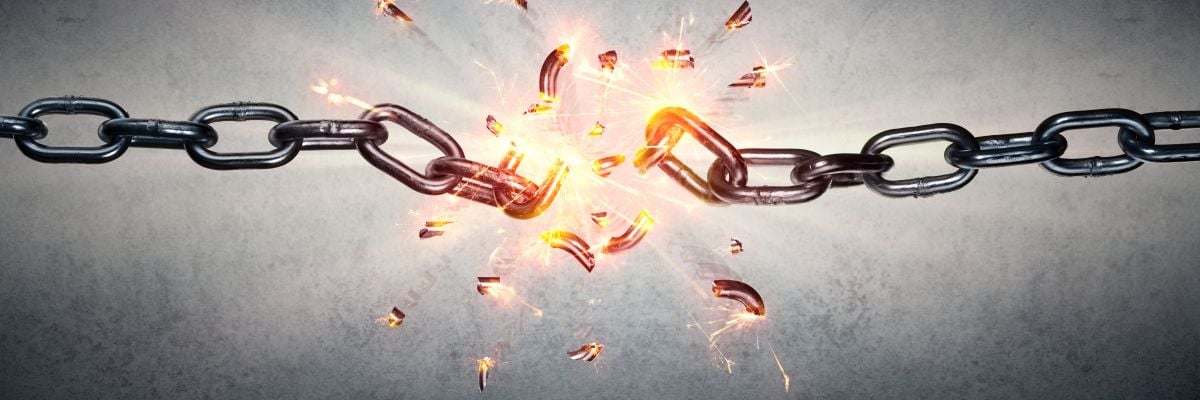
For Catholics, when God “establishes his eternal plan of ‘predestination,’ he includes in it each person’s free response to his grace” (CCC 600). Thus, anyone who is finally saved will have been predestined by God because it was God’s predestined plan and God’s grace that went before him and enabled him to be saved.
However, this does not mean that God has predestined anyone for hell. Indeed, the Bible cannot be any plainer than to say God is, “not wishing that any should perish, but that all should reach repentance” (2 Pt 3:9). God wills all to be saved. To be damned, a person must willfully reject God’s “predestined plan” for his salvation (cf. CCC 2037): simple enough.
But for a Calvinist, Ephesians 2:1 declares all who are apart from Christ to be “dead in trespasses and sins.” In that view, to say a man could freely choose to accept or reject God’s grace and invitation to salvation would be as ridiculous as saying a corpse could choose to raise itself from the dead. Moreover, for Jesus’ declaration that a man must be “born anew” in John 3:3 to include the freedom to reject the offer would be akin to saying a baby has a say in whether or not he will choose to be born.
Romans 9:18-22 is perhaps the favorite-among-favorites of Calvinists:
So then he has mercy upon whomever he wills, and he hardens the heart of whomever he wills. You will say to me then, “Why does he still find fault? For who can resist his will?” But who are you, a man, to answer back to God? Will what is molded say to its molder, “Why have you made me thus?” Has the potter no right over the clay, to make out of the same lump one vessel for beauty and another for menial use? What if God, desiring to show his wrath and to make known his power, has endured with much patience the vessels of wrath made for destruction . . .
Could Paul be clearer? Our salvation is entirely dependent on God’s unchangeable will. The free will of which the Catholic Church speaks is simply unbiblical. Shall we all join the local Calvinist ecclesial community, then? The answer seems—predestined.
Spiritual, Not Literal, Death
In fact, the Catholic Church agrees with the Calvinist in saying those who are “dead in trespasses and sins” do not have the power to “bring themselves back to life.” Man cannot “work up” grace or faith; these are unmerited gifts from a loving God (see Eph 2:8-9). The hundreds of millions of babies the Church has baptized should suffice to make this point obvious. How many good works has a baby done to merit anything from God?
A key area, among others, where Catholics and Calvinists diverge is at the definition of “dead in trespasses and sins” and “born anew.” Calvinists seem not to understand that these are metaphors. Paul is speaking of a spiritual death. Thus, the “dead” man to whom Ephesians 2:1 refers is still a human person complete with a living soul and a functioning intellect and will. No separation of soul and body requiring the reconstitution of personhood has occurred.
Moreover, by “born anew” in John 3:3, Jesus did not mean the sinner’s soul somehow ceased to exist, needing to brought into being from non-being. If this were so, then there would truly be no sense in which the sinner would be able to cooperate with God in the process.
The truth is: The soul of the unregenerate man “dead in sin” remains alive and able to know and to will (assuming we are talking about an adult convert). His soul is spiritually dead. Even though an unregenerate soul cannot merit anything from God, this does not mean he cannot cooperate with God who calls him to salvation. This seems to be what we find in the case of Saul of Tarsus. If ever a man was “dead in sin,” it was Saul. Yet, in Acts 22:16, he was asked to cooperate with the grace of God in the cleansing of his sins when Ananias said to him, “rise and be baptized, and wash away your sins, calling on his name.”
The Choice Is Ours
What the Calvinist misses is clear throughout the Bible. Man is truly free and God calls him to freely choose to serve or not to serve the Lord. From the famous Old Testament charge of Joshua to “choose this day whom you will serve . . . but as for me and my house, we will serve the Lord,” (Jo 24:15) to the very words of Jesus Christ himself, “If any man thirst, let him come to me, and drink” (Jn 7:37), man’s freedom to choose to obey or disobey the will of God for salvation is absolutely central to the teachings of Sacred Scripture.
But doesn’t a statement like “hath not the potter power over the clay” from Romans 9 seem awfully Calvinist? Not when we consider it is actually a reference back to Jeremiah 18:6: “O house of Israel, can I not do with you as this potter has done? Says the Lord. Behold, like the clay in the potter’s hand, so are you in my hand, O house of Israel.”
If you were to take this verse out of context you might get a Calvinist interpretation of Jeremiah. However, the next four verses are enlightening, to say the least:
If at any time I declare concerning a nation or a kingdom, that I will pluck up and break down and destroy it, and if that nation, concerning which I have spoken, turns from its evil, I will repent of the evil that I intended to do to it. And if at any time I declare concerning a nation or a kingdom that I will build and plant it, and if it does evil in my sight, not listening to my voice, then I will repent of the good which I had intended to do to it. (Jer 18:7-10)
Far from denying free will, Jeremiah glaringly affirms it. The same can be said of Paul. Throughout Romans and elsewhere, Paul clearly teaches all men must freely cooperate with God’s grace to be saved. For example, look at Romans 2:6-8: “[God] will render to every man according to his works: To those who by patience in well-doing [good works] seek for glory and honor and immortality, he will give eternal life, but for those who . . . do not obey the truth . . . there will be wrath and fury.”
Or try Romans 11:22: “Note then the kindness and the severity of God: severity toward those who have fallen, but God’s kindness to you, provided you continue in his kindness; otherwise you too will be cut off.”
In Romans 6:16, Paul makes clear that we must continue to obey to attain final justification: “Do you not know that if you yield yourselves to anyone as obedient slaves you are slaves of the one whom you obey, either of sin, which leads to death, or of obedience, which leads to righteousness?” (Gk. justification).
Indeed, Jesus himself could not be any clearer in Matthew 23:37: “O Jerusalem, Jerusalem, killing the prophets and stoning those who are sent to you! How often would I have gathered your children together as a hen gathers her brood under her wings, and you would not!”
As God, Jesus clearly desired to gather his children, Israel, but they would not. If the Calvinist view of predestination were true, God never willed to gather them at all. Jesus got it wrong here. If he truly willed to gather them, they would have been gathered!
Grace Is Sufficient
But what about Romans 9:18-19? “Therefore he hath mercy on whom he will; and whom he will, he hardeneth. Thou wilt say therefore to me: ‘Why doth he then find fault? For who resisteth his will?’” (D-R).
To be sure: there is a certain mystery involved in God’s predestined plan. We could ask many unanswerable questions. For example, why does God give more grace to some than others (see Rom 12:6, 1 Pt 4:10)? Why does God allow someone to be born and live knowing they will eventually choose to reject him and go to hell (see Rom 9:22)? This is precisely what Paul is talking about when he refers to “vessels of wrath made for destruction” (Rom 9:22).
We could go on. Why doesn’t God give the one rejecting him more grace? It may be true that if God had given more grace to someone in hell, he would have made it to heaven. The only response to questions like these truly is: “But who are you, a man, to answer back to God?” However, he errs who takes this to the point of turning God into an unjust God. Even if some are given more grace than others, everyone is given sufficient grace to be saved. That is clear in Scripture, as Titus 2:11 tells us: “the grace of God has appeared for the salvation of all men ” If God did not give a man sufficient grace to be saved, then God would truly be unjust in condemning him. There is no mystery there at all.
The Price of Freedom
The good news is that St. Paul has already told us precisely who God “hardens” in Romans 1:24-28:
God gave them up in the lusts of their hearts to impurity . . . because they exchanged the truth about God for a lie and worshiped and served the creature rather than the creator . . . For this reason God gave them up to dishonorable passions . . . And since they did not see fit to acknowledge God, God gave them up . . .
God’s will is immutable; therefore, God’s will is always accomplished. The mistake is to reject free will because of this truth. We have already seen that it is God’s will for all to be saved (2 Pt 3:9, cf. 1 Tm 2:4, 1 Jn 2:1-2). But it is also true that some men will not be saved (cf. Mt 7:13, 25:46; Rv 21:8). This implies the freedom to choose to serve God or not (cf. Dt 28:15, Mt 19:17-22). All of this must be understood within God’s predestined plan. How do we reconcile all of this? We conclude that God’s will has an antecedent and a consequent nature. It is God’s antecedent will that all be saved. However, as a consequence of God’s gift of free will, some reject God’s antecedent will. It then becomes God’s consequent will for that soul to go to hell. God’s will is accomplished and our free will, which is revealed in Scripture, is preserved. It is God’s predestined plan for us to have free will (CCC 600).



